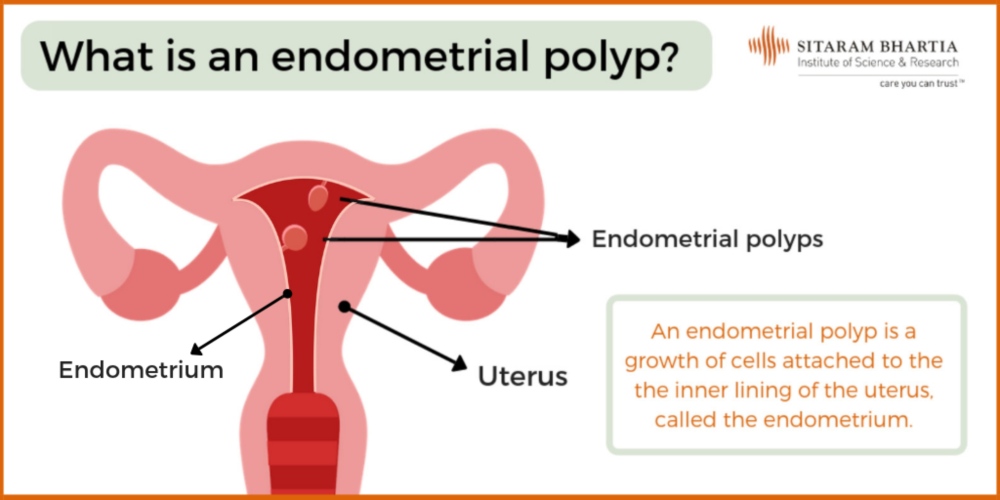Reshma Jha, 39, came in with heavy intermenstrual bleeding and something coming out of the vagina for one week. On examination, her gynaecologist diagnosed a mass, called a polyp, coming out of the vagina. She recommended removal of the same.
Upon hearing the unfamiliar term, Reshma posed some of her urgent questions to Dr. Priti Arora Dhamija, Senior Gynecologist & Fertility Expert at Sitaram Bhartia Hospital, before going ahead with her treatment.
What is a uterine polyp?
Commonly associated with abnormal uterine bleeding, a uterine or an endometrial polyp is a growth of cells attached to the inner linings of the uterus that may protrude into the vagina.

What is the cause of polyps in uterus?
The exact cause of endometrial polyp is unknown, though changes in hormone levels are a contributing factor.
Are endometrial polyps common?
“Polyps are more common in women who are going through or have been through menopause, but they may develop in younger women as well.”
Studies show that 3 out of 10 women may develop endometrial polyps at some point in their lives.
It is possible the condition may be asymptomatic in many cases, though common endometrial polyp symptoms include:
- Irregular or unpredictable menstrual bleeding
- Heavy bleeding between menstrual cycles
- Vaginal bleeding after menopause
- May be associated with infertility
Treatment of Endometrial Polyps
An endometrial polyp is usually benign and can be treated easily. It is important, however, to know that there is a small likelihood that they can turn precancerous.
Keeping this in mind, Dr. Priti urged Reshma to surgically remove her endometrial polyp and further examine it for the presence of malignant cells.
Do polyps go away on their own?
When Reshma was recommended surgical removal of her polyp, she wondered if surgical treatment was the only option for her.
“Do polyps in the uterus need to be removed?” she asked.
There are chances of a small endometrial polyp resolving on its own, so treatment usually differs depending on the endometrial polyp size.
“In some cases, hormonal medication may be recommended to relieve the symptoms but this is only a short-term solution.”
This helped Reshma realise surgery might be the appropriate course of treatment for her as it would provide her immediate relief from her condition.
How do you remove polyps from the uterus?
Dr. Priti informed Reshma that hysteroscopy is used to remove polyps from uterus. It is a safe procedure where a thin, telescope-like instrument is used to examine the inside of the uterus.
“This procedure is minimally-invasive as it allows us to remove the growths without a cut in any part of the body.”
It usually takes only 15 to 20 minutes to do the procedure and can be done under local anesthesia or short general anesthesia.
“How long does it take to recover from a polyp removal?” asked a visibly apprehensive Reshma.
“Endometrial polyp removal, or hysteroscopic polypectomyl, is a minor procedure that usually involves a short hospital stay and a fast recovery.”
Reshma felt relieved after the doctor’s encouraging words and decided to go ahead with the surgical removal of endometrial polyp.
“There is a small possibility that they recur after treatment. This is why follow up after management of endometrial polyp is an important step as well,” emphasized Dr. Priti.
There is no way to prevent endometrial polyp from occurring so regular gynecological check-ups are a must to detect this condition.
Reshma’s worries were put to rest as she recovered from frequent episodes of intermenstrual bleeding.
Do you still have questions regarding your condition? Come in for a consultation with our gynecologists! Please call on +91 9871001458 to schedule an appointment.

Medically Reviewed by Dr. Priti Arora Dhamija
MBBS, Maulana Azad Medical College, Delhi (1999); M.D, Lady Hardinge Medical College (2004); DNB Obstetrics & Gynecology (2004); Diploma in Pelvic Endoscopy, Kiel, Germany (2014)
.


